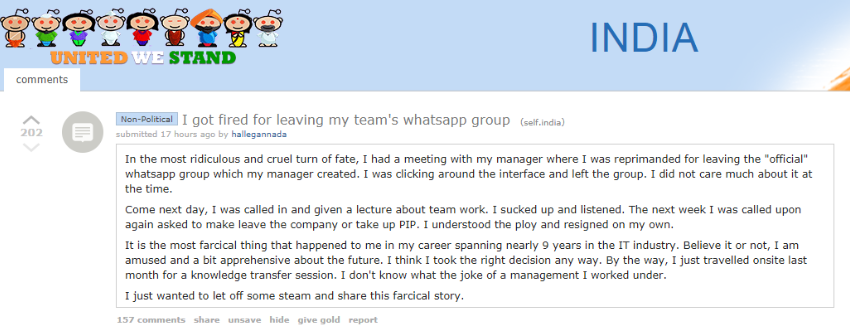- Have any questions?
- 888-432-8878
- steve@sebackground.com
Executive Assistant to the Office of the Provost – Concordia College – Bronxville, NY
July 20, 2017Regional Sales Director – Purchasing Power – Northeast, NY
July 20, 2017Whether you’re a low-level worker or a top executive, violate a company rule and you can get fired. Depending on the circumstances, you can indeed get fired or reprimanded for actions that can cause serious harm to the company. Then again, what is the pettiest thing one can get fired over? Three days ago, a 70-year-old Home Depot worker got fired for confronting shoplifters. Two days ago, Campus LGBT Center Director got fired for tweeting “Police are meant to service and protect white supremacy.” Brace yourself, for this one takes the cake – today, an IT worker in India got fired for leaving a WhatsApp Group.
The manager demanded that everyone use WhatsApp (it’s an instant messaging app), as an official tool to contact rather than calling or emailing. When the employee accidentally left the group, he was reprimanded for it. Two days later, the employee got called into the manager’s office and was given the choice of either taking PIP (Performance Improvement Program) or leave the company.
Can you really get fired for leaving a WhatsApp Group? It’s unlikely that your company would consider firing you for a reason as petty as this. On a medium like WhatsApp, which doesn’t require signing-in like Skype or Slack does, you can constantly receive messages, day in and day out. The manager, in this case, is putting a bold statement by declaring WhatsApp as an official tool of communication. He wants to easily try and contact employee even on day offs, before and after shifts, and late at night. Any employee who doesn’t comply with his commands gets fired – and, I find this highly inappropriate.
A tool like WhatsApp can be used as a means to convey messages if you work in retail or other shift-based service industry jobs. For instance, you cannot always rely on a company email address if the worker doesn’t work for 2 or 3 days in a row and they might miss an important message by the time they come back. It’s pretty common for shift workers to rely on cell phones for official communication. Secondly, the only time a manager can contact an employee during off hours is when he/she is sick and they’re trying to find someone to cover their shift.
The IT worker in this scenario could have sent an email to the higher-ups demanding them to look into this matter. It very well looks like the manager is using WhatsApp to get around data trail. Secondly, the manager is asking the workers to use their personal cellphone and personal data connection before, during and after office hours without any financial contribution from the company for said use.
An employer or the manager does not have a right to compel any employee to use their personal cellphones and personal data connection as an official tool of communication. It’s a different case altogether if the employer has issued employee work phone and they only contact before and after office hours to convey an important message.
WORK WHATSAPP GROUPS: A PRODUCTIVITY HERO?
Currently, there are over 1.2 billion monthly active WhatsApp users worldwide. It has become the largest messaging platform in countries l, ke Brazil, India and Indonesia. It’s easy to use, faster and convenient. The question is: what happens when you start using WhatsApp as a tool to engage with employees before and after work hours?
Employers and managers have come under intense pressure from work due to WhatsApp work groups. People are expected to instantly respond to any message sent by a colleague or supervisor even on weekends or on sick days. At the end of the day, the employee or even the employer is going to feel burned out, emotionally drained and mentally exhausted from the endless stream of work-related messages. It can further result into people feeling ineffective at work, chronic fatigue, depression, insomnia, and even concentration issues. In extreme cases, it can trigger Nomophobia, i.e. fear of losing phone. There is also a possibility that one might post the wrong message on a wrong group chat resulting in people getting fired, or resigning because they face their colleagues.
Employees are entitled to rest periods. Managers can only expect an employee to respond to their message outside the working hours if it’s something really important they need to discuss. Secondly, a phone call would be much more convenient rather than a text on a group chat.
Today’s case of an IT worker getting fired over leaving a WhatsApp group shows how conflicting our views are on work-life balance. The boundary between work and personal lives has become tenuous, leading to cases of burnout becoming more prevalent.
The post Can I get fired for leaving a WhatsApp group? appeared first on The HR Digest.
Source: New feed





